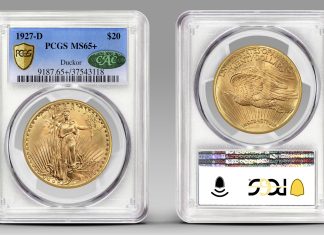A nearly 2,500-year old silver coin of Rhegion, an ancient Greek city located in would become Italy, is expected to bring upwards of $25,000 at the Heritage Signature® Auction of Ancient and World Coins at the ANA World’s Fair of Money in Boston, Thursday, Aug. 12, starting at 6 p.m.
The silver tetradrachm – lot number 20007 – a coin about the diameter of a quarter but much thicker and heavier, depicts the stylized head of a lion on the obverse and a profile portrait of Apollo, Greek god of wisdom and enlightenment, on the reverse. It was struck between 415 and 387 BC, a time when the Greek cities of Italy and Sicily were competing with each other and with Carthage in North Africa for control of the western Mediterranean.
"Simply stated, this piece is an artistic masterwork," said David S. Michaels, director of Ancient Coins for Heritage. "The artist who engraved the dies was a supremely talented individual who employed a host of sophisticated techniques in creating an image of unique power and beauty."
The lion’s head on the obverse uses foreshortening and compression to create an illusion of extreme depth, while his piercing gaze is shifted slightly to the left, as though zeroing in on his prey. The image of Apollo on the reverse is also created with such lifelike distinction that, were he to walk into a room, he would be instantly recognizable from his image on the coin.
Rhegion, modern Reggio, Italy, also called Regium, is located on the "toe" of Italy, just across the Straits of Messina from the island of Sicily. The second-oldest city in Italy, it was founded by Greek colonists from two cities on mainland Greece, Chalkis and Messenia. According to legend, the Chalkidians set forth after a famine in their homeland. The citizens appealed to the god Apollo for help, who replied through an oracle that a large body of colonists should seek a fresh start in fertile southern Italy.
Rhegion (meaning "it breaks away") prospered and built a temple dedicated to Apollo, who appears prominently on the city’s coinage. The Messenian component worshipped the demigod Herakles. The lion on the obverse likely refers to the Nemean Lion slain by Herakles as one of his Twelve Labors.
Rhegion grew rich and powerful by controlling trade through the Straits of Messina.
"During its heyday in the fifth century BC, Rhegion produced coins as beautiful as those of the great contemporary Greek cities of Sicily, including Syracuse, Akragas, and Messana," said Michaels. "There seemed to be a competition among these cities to produce the most attractive coins in commerce. Now it’s one of the highlights of one of our best-ever offerings of ancient coins."
Heritage has handled ancient coins since its founding in 1982, but the genre has seen notable growth in the last few years. David Michaels’ recent appointment, with his 25 years’ experience as a dealer of ancient coins, signals Heritage’s commitment to leading the field. He works out of Heritage’s Beverly Hills location (9478 Olympic Blvd., Ste 100).
About Heritage Auctions
Heritage Auctions, headed by Steve Ivy, Jim Halperin and Greg Rohan, is the world’s third largest auction house, with annual sales more than $600 million, and 500,000+ registered online bidder members. For more information about Heritage Auctions, and to join and gain access to a complete record of prices realized, along with full-color, enlargeable photos of each lot, please visit HA.com.






